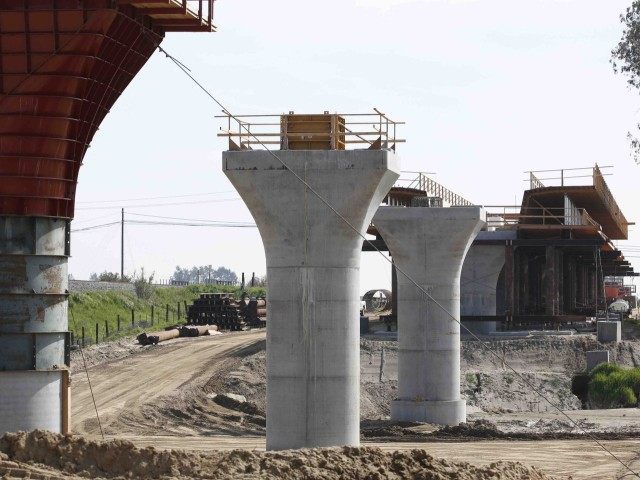California High-Speed Rail agreed to increase payments to its construction manager by 18 percent after failing to complete its first 32-mile section within the seven-year deadline.
President Obama and his Democrat congressional majority voted in 2010 to fund the California High Speed Rail (Cal HSR) with $2.5 billion under the American Recovery and Reinvestment Act as the centerpiece of a national network of 10 intercity corridors in California, the Pacific Northwest, the Midwest, the Southeast, The Gulf Coast, Pennsylvania, Florida, New York, and New England.
Cal HSR contractually agreed to provide bullet train service with top speeds of 150 miles-per-hour over the 118-mile section between Madera and Bakersfield by September 30, 2017, or give the money back to the U.S. Treasury.
But after spending $3 billion of the fed’s money and $7.8 billion from California bond sales and revenue from the state’s infamous cap-and-trade taxes, Cal HSR has failed to lay a mile of track over the initial 32-mile section of flat San Joaquin Valley farmland.
Rather than demand the money back from Tutor-Perini/Zachry/Parsons, its project and construction manager (PCM), Cal HSR recently voted to extend the term of the contract by 6 months and to raise the price from $34.2 million to $40.2 million, an 18 percent bump.
The move is even more extraordinary given that Cal HSR admits that the professional service contract was “based on qualifications of PCM and its 25 staffing resources, as opposed to low bid.” That means Tutor-Perini/Zachry/Parsons employees, even if they worked exclusively on Cal HSR, are each being paid an average of $240,000 for the next six months of work.
Cal HSR told the Fresno Bee that the delays were due to extended environmental impact reviews and the protracted pace of acquiring 822 parcels of mostly farmland, either through negotiated purchase or suing under eminent domain.
But the publicly available transcript of the August 16 Cal HSR board meeting regarding the $6 million increase for PCM specifically states: “This request to increase the PCM contract value is necessary, because the expenditure rate for PCM services has been higher than was originally anticipated and the current budget is no longer adequate to complete all the necessary PCM services.”
Cal HSR staff blames the delay on three issues; 1) “acceleration of the design-build contract work”, 2) “increase in value of the design-build contract”, and 3) “additional scope of the services that the PCM has been directed to perform.” Staff stated that there will be no increase in the overall cost, because $6 million will be deducted from the second and third legs of the initial 118-mile section.
Just hours before Donald Trump was scheduled to be sworn in as president, the Obama administration’s leadership at the Federal Railroad Administration modified part of the $2.5 billion federal grant to extend the completion deadline for the first 118-mile section of the California High Speed Rail project until 2022.
But a confidential Federal Railroad Administration risk analysis obtained by the Los Angeles Times estimated that the Central Valley section will not be completed until 2024.
Breitbart News reported in July, after the California Supreme Court ruled that Cal HSR would now have to comply with the California Environmental Quality Act, that the cost of the Los Angeles to San Francisco bullet-train, which had already ballooned from $33 billion in 2008 to about $79 billion last year, would be subject to at least another four-year delay.
With construction inflation expected to run at least 5.5 percent per year, even a 4-year delay could spike California High Speed Rail costs to $95 billion.

COMMENTS
Please let us know if you're having issues with commenting.